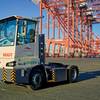Diplomats from global trade and economic powers signaled their governments' growing interest in Arctic transit and heavy shipping in the Arctic Ocean. Arctic Business Forum held in Rovaniemi from March 10 to March 12 forecast huge possibility for business and investment in the arctic region.
Kenji Shinoda, the Japanese ambassador to Finland, said the "Arctic is becoming more and more promising for collaboration" between the two nations. The growth of shipping liquefied natural gas (LNG) through the Northern Sea route from Scandinavia to Japanese ports has been "impressive," and the Barents Sea, which cradles Scandinavia and Northwest Russia, is an "active and enticing region for various sectors."
"Now is not too early to start looking vigorously for these opportunities," Shinoda said.
Malte Humpert, the director of the Arctic Institute and a maritime shipping expert, said shipping will play an outsized role in the region's future. However, he tempered notions that the Northern Sea Route -- which connects Europe and Asia by wrapping around Russia's north -- could soon replace more established routes.
At a high-level Arctic Summit, organized by The Economist magazine in Oslo on 12 March, the International Chamber of Shipping (ICS) – the global trade association for merchant ship operators – highlighted important issues associated with the growth of Arctic shipping and expressed confidence in the industry’s environmental performance.
Peter Hinchliffe, ICS Secretary General, explained that the International Maritime Organization (IMO) is the appropriate forum for developing standards for ships operating in the Arctic as it has the necessary legal and technical expertise to take full account of the interests of all maritime nations including those with an Arctic coastline.
ICS stressed the critical importance of a mandatory and uniform regulatory framework to ensure maritime safety and environmental protection, as the volume of Arctic shipping gradually increases in response to new interest in developing the region’s natural resources.
The speakers including business leaders, diplomats, academicians and government officials emphasized attracting foreign investors to the arctic region and its various sectors like industry, shipping, mining, energy, transport and logistics.
Canadian Ambassador to Finland Andrée N. Cooligan said Finnish firms – shipping, maritime and arctic - have much to gain by establishing a first-to-market investment in Canada following the Canada-European Union Comprehensive Economic & Trade Agreement (CETA). She said CETA helps eliminate tariffs and reduce non-tariff barriers.
As sea ice decreases and Arctic navigation becomes more prevalent, IMO is developing the Polar Code to address ship safety and environmental protection in Polar waters.













